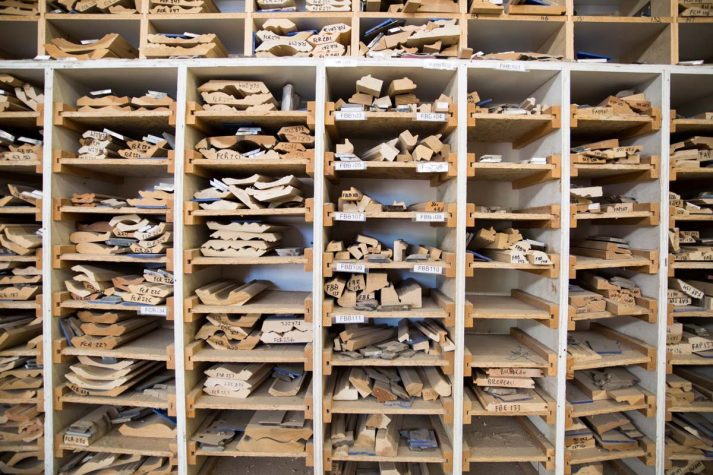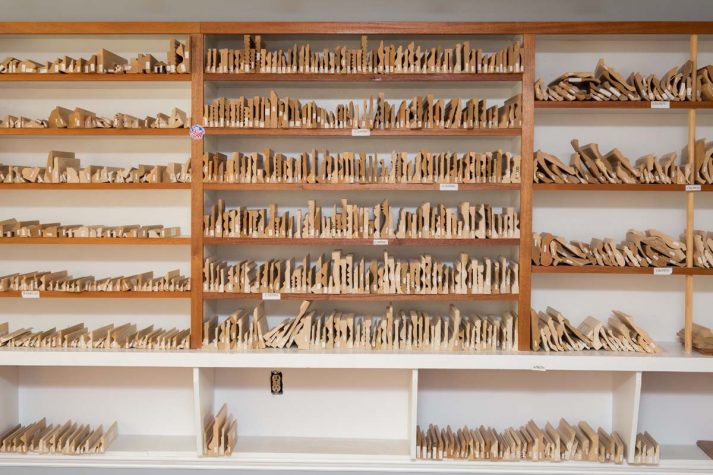Going with the Grain
From custom stair parts to countertops, millwork to mouldings, the wood products at Fat Andy’s Hardwoods are sure to wow.
A trip to the showroom at Fat Andy’s Hardwoods in North Yarmouth is a little bit like being in a real- life, find-the-difference puzzle. At first glance, it seems like an ordinary room. Then you start looking closely and notice that every detail—from the windows to the wall treatments—is a little bit different from the other. “It’s with the intent of giving people several options to really help them visualize how something will look in their home,” says founder and majority owner Andy Walsh, who runs the shop with his partner Chris Calise.
After a pipe burst and flooded their previous space, the manufacturer, distributor, and installer of thousands of custom stair parts, flooring, countertops, millwork, and mouldings reopened this spring. “We decided that, if we were going to rebuild the showroom, we were really going to update and modernize it,” says Walsh, who, it might be noted, is the opposite of the store’s moniker. (The name hails from when his then two-year-old daughter mispronounced a combination of Andy’s name and her uncle Pat’s.) Walking around the space, Walsh points out how it’s built to showcase all the hardwood products they offer. The central staircase features two baluster styles—turned and square—and two handrail options—post- to-post and over-the-post—while the windows display various moulding combinations, from standard casing to picture framing. Underfoot, 45 different flooring varieties such as tiger maple plank, Brazilian cherry, and white ash are inlaid so customers can really get a glimpse of what a sample will look like—no imagination required. And, in case none of the built-out options are quite right, Fat Andy’s has a thousand smaller samples on the wall racks and also is able to custom make any type of moulding within two weeks, thanks to their computerized template machine.
In the back of the showroom, toward their mill facilities, is Walsh’s office. Trained as an invertebrate zoologist, and a regular lecturer at Rockport’s Center for Furniture Craftsmanship, Walsh has an academic background, but he clearly ended up in the right business. He’s admittedly something of a wood geek. “I like the variety in wood, and I like its challenges in terms of the properties that make it interesting to work with,” he says, sitting down at his handmade bird’s-eye maple and walnut desk that displays a stack of business cards printed on cherry and sassafras. He explains that wood is an anisotropic material, meaning its properties vary in orientation to the grain. “No two pieces are identical, so your possibilities for variation and interest are almost infinite,” he notes. In fact, the whole operation grew out of his love for woodworking when, 20 years ago, his local woodworking association asked him to help import hardwoods. When he began running out of room for lumber in his garage, a business was born.
Walsh’s passion for the material has driven the company’s focus on quality and longevity. “I got into manufacturing and discovered that I love making something that’ll be here long after I’m gone,” he says. Recalling one of his early projects rebuilding a synagogue staircase, he says, “I was taking it apart, and when I pulled up one of the stair treads, there’s this guy’s name and the date: 1896. I started signing my stairways after that. I’m hoping that in 100 years someone will have the same experience with one of mine.”
Tips for selecting hardwood flooring & mouldings
- If you don’t have a climate-controlled house, pick a wood species that is fairly stable and won’t be warped by humidity, such as ash or cherry, or one with quarter-sawn grain. Keep the width of the boards narrower to avoid cupping in summer and widened gaps in winter.
- Pick a type of wood flooring that you like the look of, but also consider the characteristics of the wood in regards to hardness, dimensional stability, and grade. These factors all affect durability, how easily it might be scratched, and wood movement.
- In order to create a harmonious space, casings, base, headers, and crowns should all work together and feel similar in terms of their relative size and profile. For example, it’s best not to mix a sample Shaker-style baseboard with elaborate Victorian crown moulding. Similarly, consider a moulding’s size and profile in relation to a room’s dimensions to select something that feels proportionately correct for the space.








